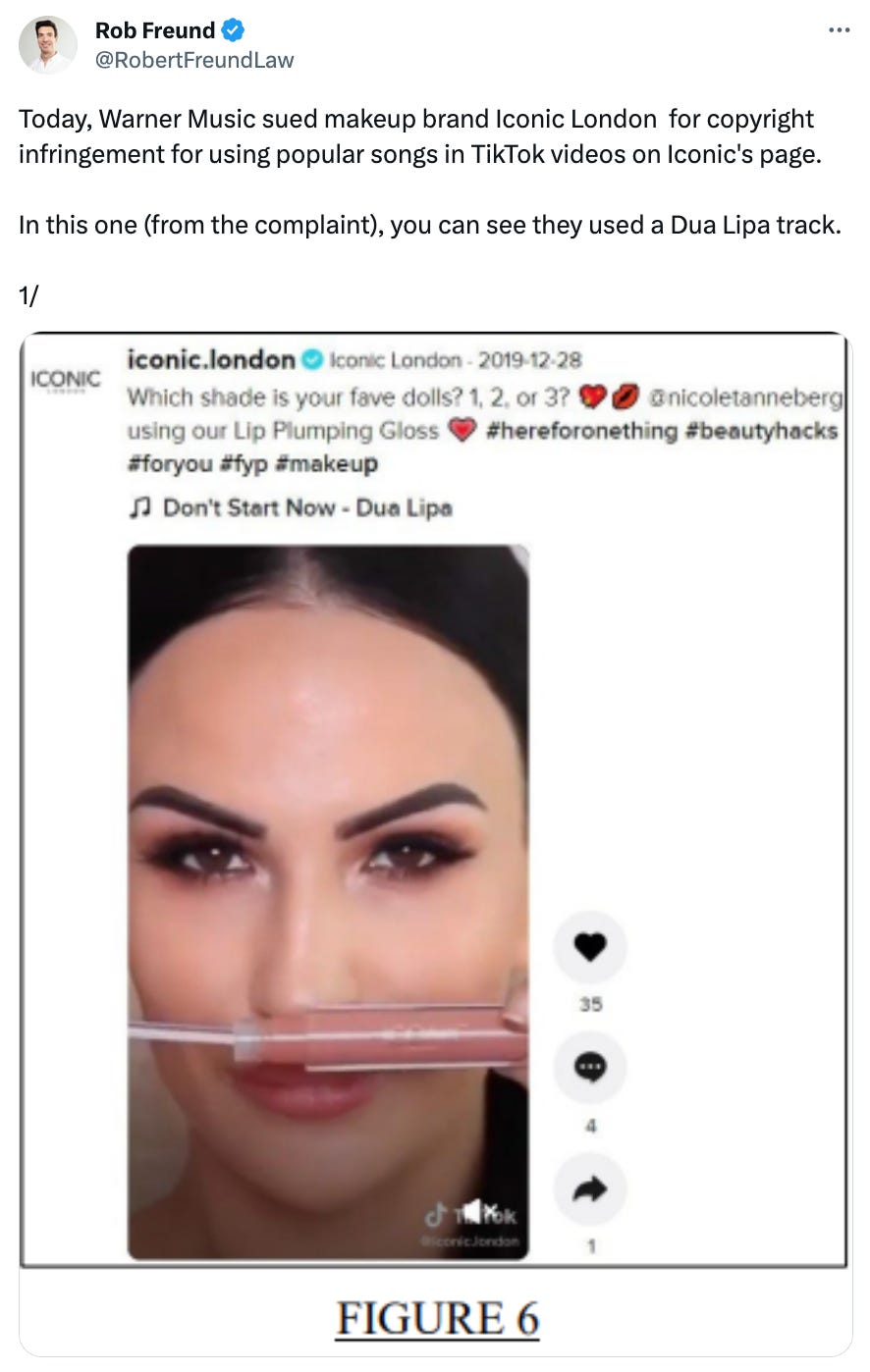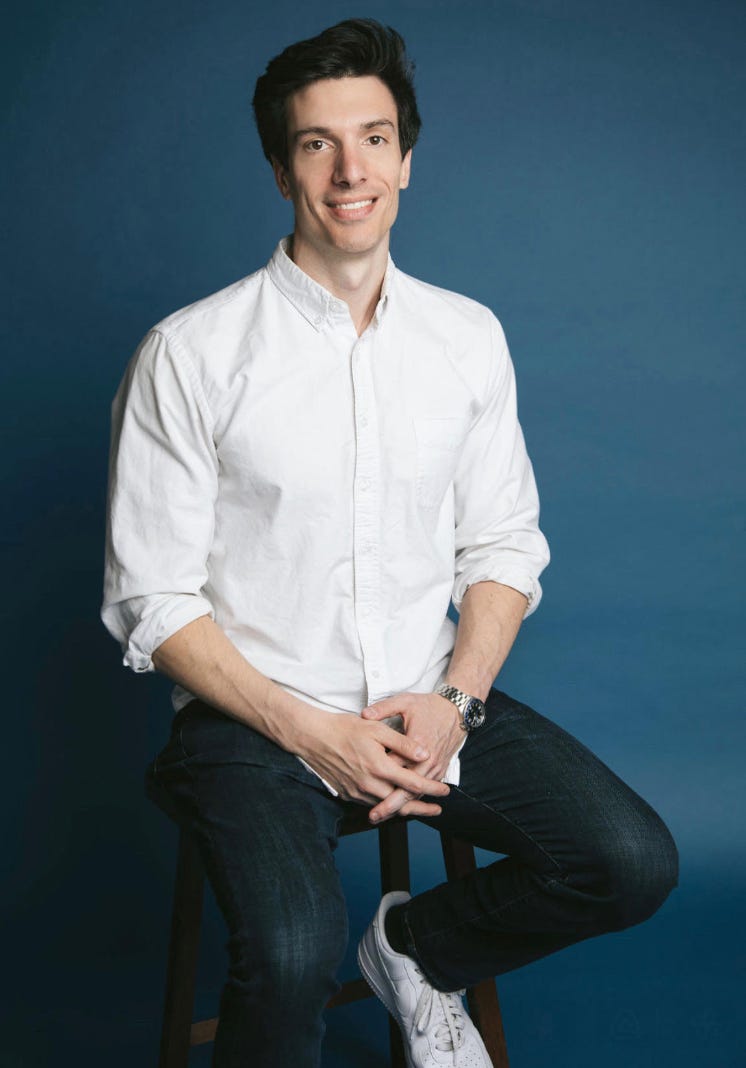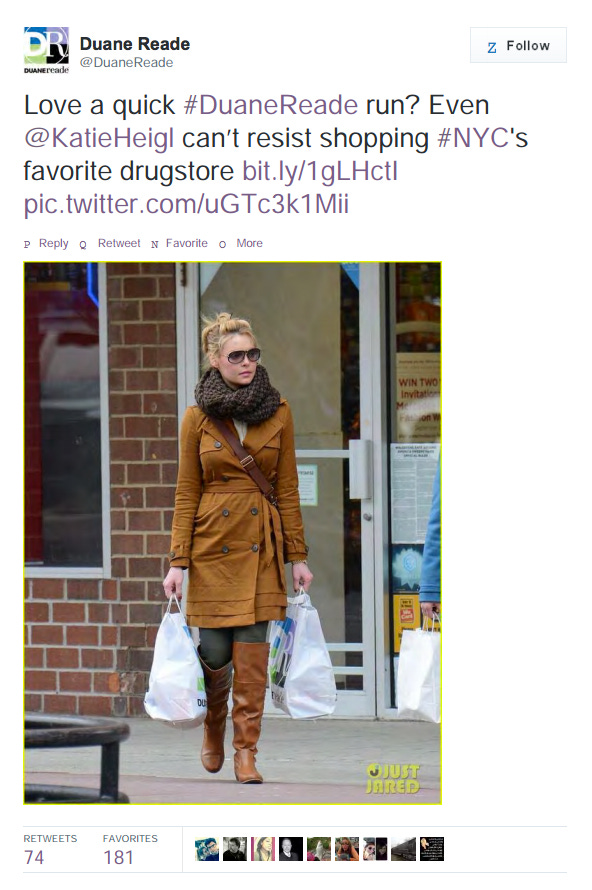Your Social Media Legal Questions, Answered
I asked Rob Freund, a lawyer focused on advertising compliance issues, lots of questions.
When I started working in social media, I wouldn’t have believed you if told me that the team I’d be working closest with was legal. From music usage rights to influencer contracts to giveaway terms and conditions—there’s a lot more collaboration between the two departments than I’d ever imagined.
Still, despite working closely with legal teams, there are so many outstanding questions I still have. How risky is using trending audio? Can we post a celebrity with our product? What’s the proper way to get clearance for UGC? When working with influencers, if the influencer doesn't properly disclose the partnership, is the brand also at risk? Am I personally at risk for something I post on behalf of a brand?
For today’s newsletter, I reached out to Rob Freund, who I originally found via his helpful Twitter account, to answer allllllll of those big questions I (and probably you) still have.
Rachel Karten: First, could you tell me a little bit about your background? What types of legal issues do you currently focus on?
Robert Freund: For the first 6.5 years of my career, I was a commercial litigator at Greenberg Traurig here in Los Angeles. I worked on cases defending businesses from false advertising class actions, and in 2019, I left to start my own practice.
I primarily work with consumer brands and marketing agencies on advertising compliance issues, helping them identify risk and (hopefully) avoid litigation in the first place. I also serve as outside general counsel for some clients, assisting them with general business and transactional matters, and I work with creators on brand deals and establishing and growing their own brands.
RK: What's the risk of using trending audio on the brand account? I wrote about this here, but would love your perspective.
RF: If a brand or creator uses audio in commercial or sponsored content, they need to ensure that they've cleared the rights to use that audio, or else they face the risk of copyright infringement lawsuits.
Record labels have successfully sued brands for using trending audio without appropriate licenses in connection with posts made directly on the brand pages and via influencer pages. Notably, in the case against Bang brought by Sony, the court ruled that Bang was liable for infringement based on its influencers' posts. I discussed this in more detail here and here.

RK: How risky is it for brands to use existing meme templates?
RF: It's risky, because whomever created the original underlying images used as the template owns the copyright in those images by default.
Generally, any time a brand posts to its own pages, that content is treated as the brand's advertising, so a brand's use of a meme is commercial speech, which does not enjoy the same broad First Amendment protection that non-commercial speech does.
RK: Similarly, is it more risky to post a meme or image that specifically uses IP (think: Elmo meme) or a celebrity (think: Kourtney Kardashian meme) vs a stock image meme?
RF: It is much more risky to use a meme or image that includes a celebrity (or even non-celebrity) likeness or brand IP.
For example, FJerry LLC (Jerry Media) owns the rights to the Dude with Sign images and has the exclusive rights to the Dude's (Seth Phillips) likeness. FJerry has sued at least half a dozen brands in the last year for using the Dude With Sign meme template in ads.
I discussed these cases here.
RK: Can a brand ever repost a celebrity using their product?
RF: Only with that celebrity's permission, or else the celebrity will likely have a publicity rights claim against the brand.
The most famous example of a brand getting this wrong is when Katherine Heigl sued Duane Reade for $6 million over a Tweet showing the actress leaving a Duane Reade store. It's important to note that publicity rights don't just protect celebrities—all individuals can bring similar claims, at least in states like California.
So reposting an influencer or other social media user, regardless of their following or prominence, can subject brands to publicity rights claims, and these cases are common.
RK: When reposting user generated content (posts a brand is tagged in from users/customers), what's the proper way to get clearance for organic usage?
RF: The best way is to have a written agreement with the creator that sets out the terms of the license, including any payment terms, duration, type of use, where the content will be used, and by whom, among other things. While this sometimes can be achieved via DM if carefully worded, a separate written agreement is the best practice. It doesn't have to be a long treatise of a document; a page or two can usually suffice. It's important to remember that simply tagging a brand does not convey any rights to that brand whatsoever.
RK: When working with influencers, if the influencer doesn't properly disclose the partnership, is the brand also at risk?
RF: Unequivocally yes. The FTC has reiterated that compliance with its rules regarding disclosure of "material connections" between advertisers and endorsers is a responsibility shared by both the brand and the influencer.
This is a quote from the recently updated FTC document, "FTC's Endorsement Guides: What People Are Asking: "The big-picture point is that the ultimate responsibility for clearly and conspicuously disclosing a material connection rests with the influencer and the brand." The FTC says brands should have training, compliance, and monitoring programs in place to help ensure that their influencers are complying with their disclosure requirements.
RK: I wrote about a creator who made a trending sound that a brand then used on a billboard. Can you explain some of the legalities around creating a trending sound and what rights creators have?
RF: Whenever someone produces an original, creative work—whether it's a photo, video, piece of writing, song, or audio—they own the copyright to that work by default. Uploading that work to a social media platform can grant some licenses to that work, but the major platforms do not claim ownership.
Uploading to TikTok grants the platform a license to allow others to share the content within TikTok, but not for commercial purposes. If a brand uses a creator's original, trending sound without permission, they may be liable for copyright infringement. Creators can submit DMCA takedown requests to TikTok, and if they have registered the work at issue with the Copyright Office within the requisite time period, they may have grounds to sue for copyright infringement.]
RK: A big trend right now is employees of companies doing "day in the life at ____ company" videos on personal channels. Are there any risks to this type of post?
RF: This is more of an employment law question than an advertising one, but yes, there are risks.
Employers may have social media policies that prohibit posts that include things like confidential employer information or overly offensive speech, and employers can lawfully terminate employees for such posts, depending on the circumstances.
RK: I also wrote about brands reposting art, architecture, and more to create "mood boards" on social. What makes an image in the "public domain" vs not?
RF: The same copyright considerations apply to mood boards as to any other kind of content. "Public domain" is not the same thing as "publicly accessible." A work is in the "public domain" if it isn't protected by copyright law, which can happen for a number of reasons, including: (1) the copyright has expired; (2) the work was created by the US government; or (3) the work wasn't original enough for protection. It is a common mistake to think that content is fair game just because it is publicly available via Google or has already been shared on public social media accounts. It's not.
RK: Anything to consider when brands partner with influencers under 18? Tariq (Corn Kid) comes to mind.
RF: Minors don't have capacity to be bound by contracts, so brands should ensure that any agreements are executed by the minor's parent, legal guardian, or someone else with authority to enter agreements on the minor's behalf.
The laws and requirements regarding hiring child actors/models are more employment issues than advertising ones, they vary state-by-state, and are summarized here.
Brands partnering with minors should also carefully consider whether the campaign will be targeted to children. Advertising to children opens up an entire additional regulatory can of worms. Of course it can be done, but it requires compliance with the FTC's COPPA Rule and the BBB's CARU guidelines. It also implicates privacy compliance issues, especially with respect to state laws like California's AADC and the children-specific sections of the CPRA and other state privacy laws.
RK: Importantly, how exposed is a social manager for any of the above issues? Can a social manager be personally sued for posting UGC illegally or creating a meme using Kourtney Kardashian and posting it to the brand account?
RF: The answer depends in part on whether the SMM is an employee of the brand or is an independent contractor. This is another question that gets at employment law issues more than advertising ones, and I can't claim to be an expert on those matters.
That said, my understanding is that if the SMM is an employee and is not an officer or director of the company, then generally speaking, the employer will be liable for the SMM's rights clearance obligations and not the employee personally.
If the SMM is a contractor—especially if they are a sole proprietor/freelancer and not an employee of an agency or other separate business entity—they may be personally liable for the copyright and publicity rights issues we've been discussing.
RK: Thank you so much for taking the time to answer these questions!
Earlier this week, I sent a Logged On post that covered:
Social managers making their “boss” the main character
Shinola actually making their April Fool’s Day joke
Four accounts on Threads I am digging
And lots more!!!
I want to remind everyone that this newsletter is an educational resource and can likely be expensed through your company! I have even written a handy template for you to use when asking! If you are going to expense this through your company, please consider paying annually.
Every 50 paid sign-ups I receive, I comp 10 paid subscriptions for students or people who can’t swing the fee, so if you’re interested in being comped, please sign up here.











Wow, this was equal parts incredibly informative and absolutely terrifying
Rachel is dropping hits after hits like DJ Khaled saying Another one!